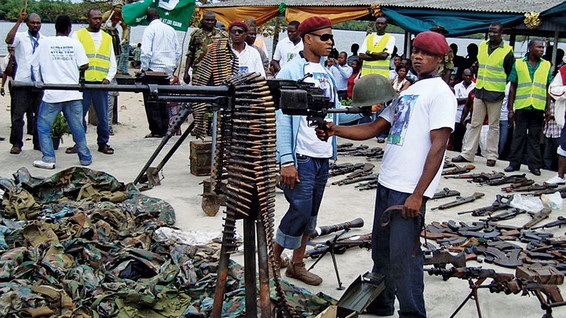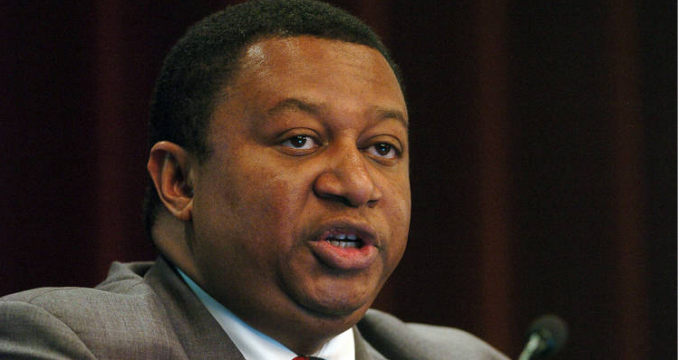Desperate measures are children of desperate times, herculean situations and last resorts.
Be that as it may, desperate actions also do require some semblance of common sense and safety measures, just in case all goes south.
But what do you do when there’s no luxury of safety measure nor room for multiple options?
What path does one tow when one finds self at such crossroads – to which we look on to gut feeling, wisdom and discretion for the next course of action.
Advertisement
The Nigerian army is at such a point – where it seeks to unofficially include retired Niger Delta militants on the amnesty payroll of the federal government in the operation to fight their younger counterparts who are toying with the jugular of the country ― by blowing up oil pipelines at will.
The new security arrangement/architecture is called “Operation Delta Safe”.
SOME EX-MILITANTS HAVE TAKEN UP ARMS AGAIN
Advertisement
Oby Ezekwesili, former minister of education, once said Nigeria is at best a country, not yet a nation… but to many naysayers, this so-called country even has symptoms of a failed state.
On many levels, Nigerians have to dig deep to search for effort and will, just to get along ― a function of real, perceived, assumed and concocted injustices.
This is also a function of how little faith we have in each other.
The first batch of Niger Delta militants were granted amnesty by the government of late Umaru Yar’Adua ― in a deal that saw the militants lay down their arms in exchange for a monthly salary for doing nothing, in many cases.
Advertisement
The “receive alert and maintain the peace” process ensued smoothly until the economy developed a fever that still lingers, and payment became infrequent and unreliable.
Some ex-militants who lack the spirit of patience, rumour has it, have taken up arms again and are partaking in the recent spate of attacks on pipelines in the Niger Delta.
Doing business with people who have tendencies to go rogue once funds dry up, is at best, risky.
THE CURSE OF MISTRUST
Advertisement
The people of the Niger Delta ― elders and young ―, the militants in the creek ― new and old ―, hardly trust the federal government and the army.
Over time, this lack of trust has hindered and largely curtailed development in the Niger Delta region.
Advertisement
This lack of cooperation and mutual get-along has prevented a sustained solution to the problems of the region and lingering headache of militancy.
At present, the people of Oporoza in Gbaramatu kingdom, Delta state, have little love for the military, owing to its alleged invasion during the futile search for notorious militant leader, Tompolo.
Advertisement
A communique issued at the end of a recent meeting convened by Edwin Clark, called on President Muhammadu Buhari to “as a demonstration of sincerity of commitment to dialogue”, “immediately withdraw the military from all occupied Ijaw communities, particularly Gbaramatu kingdom. The meeting also called on the government to immediately release the 10 innocent students of Gbaramatu kingdom.”
If they aren’t yet on the same page, how can they be brothers in arms?
Advertisement
AFTER YEARS OF FREE SALARY, WHY WORK FOR THE MONEY?
During a recent visit to Bayelsa state government officials, Mansur Dan-Ali, Minister of Defence, made it clear that it was high time militants on government payroll became “useful”.
“We are also of the opinion of getting some of these amnesty students that have graduated involved in the security architecture.”
“They are being paid and we are thinking of the way they can be useful to us instead of just paying them”, Dan-Ali added.
But how many would be so enthused about having to work for allowances they’ve become accustomed to getting without lifting a finger?
In time, we’ll know.
IT HAPPENED IN BORNO, WHY NOT NIGER DELTA?
In Borno, civilian JTF were recently inducted into the army, and same can be done in the Niger Delta states, many would argue.
But it is one thing to conscript members of Civilian Joint Task Force into the army and it’s another kettle of fish to attempt to use old, retired militants to fight new militants.
The fundamental difference therein becomes obvious.
Again, what’s to say the old guard wouldn’t be sympathetic to the young guns in the disposition of their tasks, whatever it may be.
THE LACK OF SYNERGY
The bane of Nigeria’s security architecture, across board, is an absence, almost an aversion, to synergy.
Just as the military and Niger Delta people hardly get along, same can be said for Nigeria’s security agencies.
The Police, Army, NSA EFCC, DSS and other security agencies, hardly ever have a cooperative attitude whenever they have to work together.
If the nation’s security agencies can’t be cohesive, how does it hope to work hand-in-hand with former militants?
Add a comment







